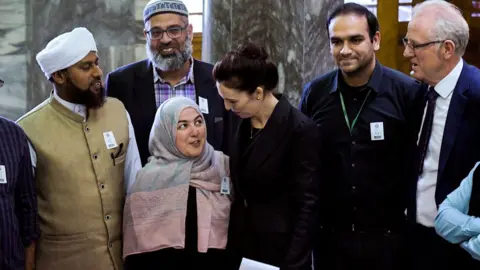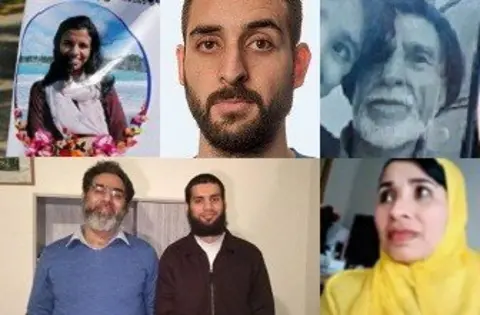Christchurch shootings: Ardern vows never to say gunman's name
New Zealand's Prime Minister Jacinda Ardern has vowed never to say the name of the Christchurch mosque gunman.
"He sought many things from his act of terror, but one was notoriety - that is why you will never hear me mention his name," Ms Ardern said in an emotional address at New Zealand's parliament.
Last Friday's shootings at two mosques left 50 people dead and dozens wounded.
Australian Brenton Tarrant, 28, a self-described white supremacist, has been charged with murder.
What did the PM say in parliament?
The prime minister addressed a special meeting on Tuesday, opening her speech by using the Arabic greeting "Al-Salaam Alaikum", which in English means "peace be upon you".
She said: "I implore you, speak the names of those who were lost rather than the name of the man who took them. He is a terrorist. He is a criminal. He is an extremist. But he will, when I speak, be nameless."
 Getty Images
Getty ImagesMs Ardern assured MPs that the attacker would "face the full force of the law". She encouraged New Zealanders to acknowledge the grief of the Muslim community this Friday - which is the Muslim day of worship and will mark one week since the shooting.
Ms Ardern has already announced that the nation's gun laws will be reformed and that the details would be presented within days.
The prime minister also called on social media platforms to do more to combat terror, after the gunman in Christchurch live-streamed his attack on Facebook.
"We cannot simply sit back and accept that these platforms just exist and that what is said on them is not the responsibility of the place where they are published," she said. "They are the publisher. Not just the postman. There cannot be a case of all profit no responsibility."
What has Facebook said?
On Tuesday it said that the gunman's video was viewed fewer than 200 times during the live broadcast, and about 4,000 times in total before it was removed.
The social media company said it removed more than 1.5 million copies of the video in the first 24 hours after the incident, 1.2 million of which were blocked while being uploaded.
What's the reasoning behind the PM's no-naming drive?
This is not the first time disturbing material has appeared on social media related to mass shootings, with many survivors and victims' relatives angered by the publicity it affords the attackers.
The parents of one victim of the mass shooting at a movie theatre in Aurora, Colorado, in 2012 set up a campaign called No Notoriety to tackle perpetrator-focused news coverage.
Its website argues for "no name, no photo and no notoriety", challenging the media to "deprive violent like-minded individuals the media celebrity and media spotlight they so crave".
The Don't Name Them campaign by the ALERRT Center at Texas State University is similar, arguing that giving attackers publicity "allows the shooter to accomplish one of his goals, and validates his life and actions".
The New Zealand legal system does have a name suppression option under the Criminal Procedure Act 2011.
Courts can suppress the identity of the defendant if, among other things, it would prejudice a fair trial, cause undue hardship to the defendant or any victim of the offence or endanger the safety of any person.
The identity of a man accused of murdering British backpacker Grace Millane has been suppressed by the High Court, although some UK media outlets have still named him, arguing the law does not apply in the UK.
The New Zealand Herald reported on Tuesday that the mosque gun suspect had been moved to a maximum security prison in Auckland where he was segregated, had had no visitors, and was being denied access to newspapers, television and radio.
He appeared in court last Saturday and entered no plea. His state-appointed lawyer said the suspect did not want his services and had indicated he would represent himself from now on.
Have burials begun yet?
Islamic tradition calls for the cleansing and burial of bodies as soon as possible after death, but this has been delayed because of the slow process of identification and forensic documentation.
Police on Tuesday said the bodies of six victims had now been released to families. They said that 12 bodies had been formally identified and all 50 post-mortem examinations were complete.
A statement read: "Police are acutely aware of frustrations by families associated with the length of time required for the identification process following Friday's terror attack.
"We are doing all we can to undertake this work as quickly as possible and return the victims to their loved ones."
Mohamed Safi, 23, whose father Matiullah Safi died at the Al Noor mosque, complained about the lack of information.
He told AFP news agency: "They are just saying they are doing their procedures... Why do I not know what you are going through to identify the body?"
The bodies of some of the victims were being washed and prepared in a Muslim ritual process on Tuesday, partly with the help of volunteers flown in from overseas.
New Zealand's immigration service said it was processing visas for the families of the victims seeking to come from abroad to attend funerals.

Victims of the Christchurch shootings
Fifty people lost their lives in the shootings at new mosques in the city.

